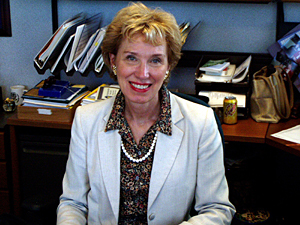Photos
| ||||||||||||||||||||||||||||||||
August 14, 2005
 |
| Education Commissioner Alice Seagren doesn't want school districts applying for Q-Comp money unless they're committed to reforming teacher pay. (MPR Photo/Tim Pugmire) |
Roseville, Minn. — When the state dangles a carrot of extra money, school districts usually pounce.
The new incentive provides $260 per student to school districts willing to scrap the traditional system of automatic salary increases, which are based on seniority and education levels.
But Education Commissioner Alice Seagren warned that school leaders should not apply for this new funding unless they're committed to the reform.
"We don't want to send the message that this is something that you can game and think you can just pick up $260 per student and have something that's not going to be a very significant change in the way you pay your teachers and the way you structure their professional development." Seagren said.
To get the money, school districts must explain in detail the evaluation system they'll use to measure a teacher's classroom performance. The application also calls for a description of the new career advancements and professional training opportunities available to teachers.
Each local proposal must be reached through collective bargaining. Teachers won't lose any financial ground under the new system, but Seagren said future pay raises will come only when teachers meet specific goals, such as raising student test scores or completing a training session.
"I think good teachers want to be recognized for their effort, and good teachers also want to continually improve their skills," Seagren said. "And when you have those two things joined together I think ultimately it improves student achievement."
Seagren says her department has already received inquires from about 100 school districts. She estimates only about 10 will be ready to make the switch this fall. Most of the funding will be awarded next year.
The Hopkins school district is trying to be among the first in line. Nik Lightfoot, the district's human resources director, says discussions about alternative compensation have been underway in Hopkins for four years. The district and its teachers approved a new contract earlier this summer that establishes a performance-pay system.
"It's two years in this contract," Lightfoot said. "And if the two years doesn't work, if it doesn't deliver what we believe it should deliver, it doesn't bring the added value that we hope it does, then we know we can go back to what's there."
The president of the local teachers union in Hopkins declined an interview request for this story. But teachers elsewhere are talking, even though many don't know a lot about the concept. Alternative compensation was a hot topic earlier this month in St. Joseph when the statewide teachers union Education Minnesota held its annual summer seminar.
Joe Brotzler, the local union president in South St. Paul, still has a lot of questions.
"I'm sure we're going to have some members saying, 'Hey, there's additional money here for us, let's go for it,'" Brotzler said. "But we're going to need to educate them on what the provisions of the statute are and the requirements and that this is something that we're not going to just jump into haphazardly."
Teachers in other school districts are also urging caution. Rick Bruns, who works in the LeSueur-Henderson school district, thinks it wise to move slowly.
"People in general don't like change, especially when it deals with finances," Bruns said. "We at LeSueur-Henderson aren't really interested in being the first ones going in head first. We really want to take our time and put together something that would be good for our members."
Teachers and school district administrators will get a chance this week to learn more about alternative compensation. The Minnesota Department of Education is hosting a daylong conference on the subject Wednesday in St. Paul.






